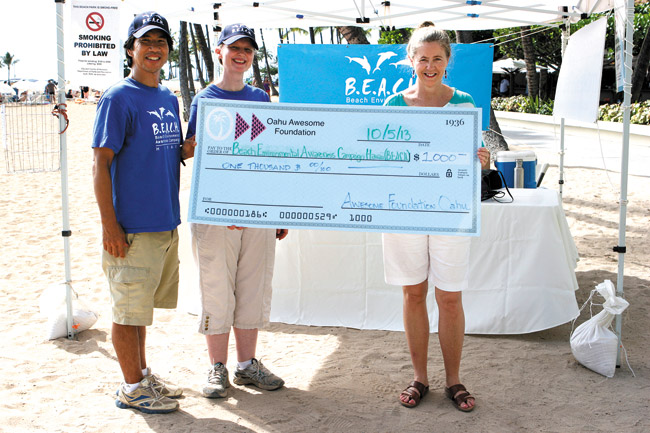Being Vigilant About Beaches

Dean Otsuki and Suzanne Frazer, co-founders of Beach Environmental Awareness Campaign Hawaii, accept a $1,000 grant from Awesome Foundation of Oahu representative Donna Ambrose (right). Photo courtesy of B.E.A.C.H.
B.E.A.C.H. is on a holiday campaign that nicotine cravers might not want to hear. The Hawaii Kai-based group is alerting smokers that come Jan. 1, 2014, the city will extend its cigarette ban to the entirety of its beach parks, inland parks and all recreation areas.
Beach Environmental Awareness Campaign Hawaii helped to get Bills 72 (smoke-free beaches law) and 25 (islandwide smoking ban) passed last summer, and is determined to see it all implemented successfully in the new year.
“Cigarette butts are the most littered plastic item on Hawaii’s beaches and in the world,” stated co-founders Suzanne Frazer and Dean Otsuki, “and they are made from toxic chemicals, including arsenic, hydrogen cyanide and formaldehyde.”
The couple has been on patrol since April, when the law began to take effect at selected sites, including Sandy Beach. They have created information cards, posters, fliers, signs and other handouts to be used by city staff, hotels, tour guides and taxi drivers to get the word out about “putting the butts out.”
Enforcement should also make a dent in public smoking: Fines are $100 for the first offense, $200 for the second and $500 for the third.
B.E.A.C.H. also devotes time to other kinds of shoreline cleanups, and won a $1,000 grant in October from the Awesome Foundation to help implement its wire bin brigade. The nonprofit had several people trained on how to make the HI-5 wire recycling bins for beachgoers who can either leave or take discarded cans and bottles from them. The grant helps purchase tools and supplies for making bins, and signs to explain their use. Frazer and Otsuki completed several bin-making workshops this fall.
To join their efforts, visit b-e-a-c-h.org or call 393-2168.





